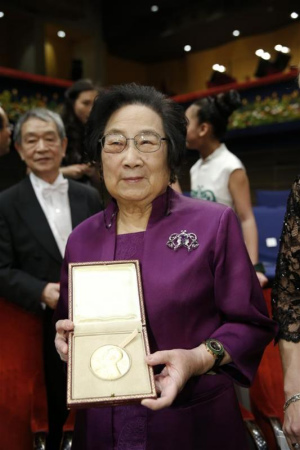
2015's Nobel laureate in Physiology or Medicine Tu Youyou (L) shows her medal following the Nobel Prize award ceremony at the Concert Hall in Stockholm, capital of Sweden, Dec. 10, 2015. (Photo: Xinhua/Ye Pingfan)
Five minor planets have been named after top Chinese scientists, including the country's first Nobel laureate scientist Tu Youyou, at a ceremony held Monday.
The naming was suggested by the National Astronomical Observatories of the Chinese Academy of Sciences (CAS) and approved by the International Astronomical Union (IAU) Minor Planet Center (MPC). Chinese vice premier Liu Yandong awarded scientists certificates at the ceremony.
Minor Planet No. 31230 was named after Tu, who won 2015 Nobel Prize in Physiology or Medicine for discovering artemisinin to treat malaria and saved millions of lives.
Minor Planet No. 12935 was named after Zheng Zhemin, a prominent dynamicist and one of the founders of the field of explosion mechanics.
Minor Planet No. 19282 was named after Zhang Cunhao, who is the founder of the field of high-energy chemical lasers in China and one of the pioneers in the field of molecular reaction dynamics.
Minor Planet No. 32928 was named after Xie Jialin, a renowned physical scientist and the founder of particle accelerators in China.
Minor Planet No. 9221 was named after Wu Liangyong, an architect, city planner and educator.
The four scientists, except Tu, previously won the State Top Scientific and Technological Award, the country's top science prize, for their outstanding contributions to scientific and technological innovation.
The five minor planets were discovered between 1995 and 1999 by the Beijing Schmidt CCD Asteroid Program at the Xinglong observation station in north China.
According to international conventions, discoverers of minor planets who receive confirmation from the MPC have the right to name the new planets.


















































